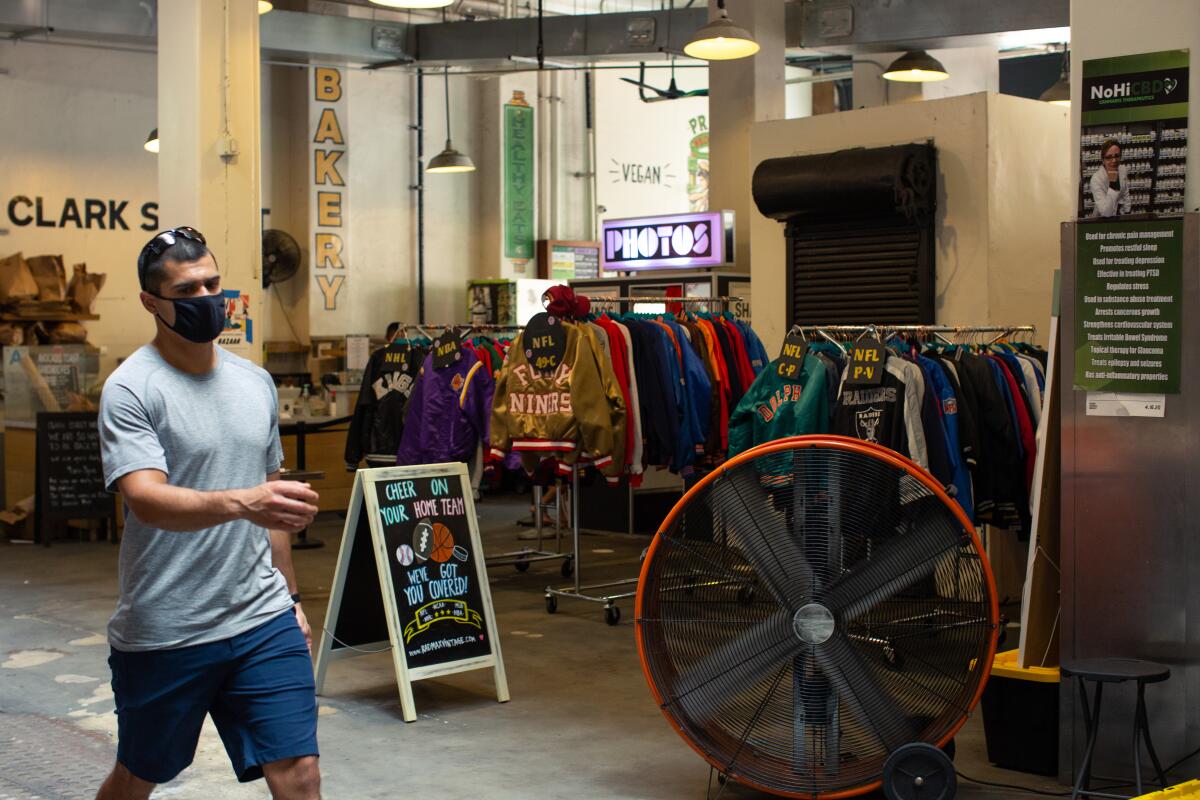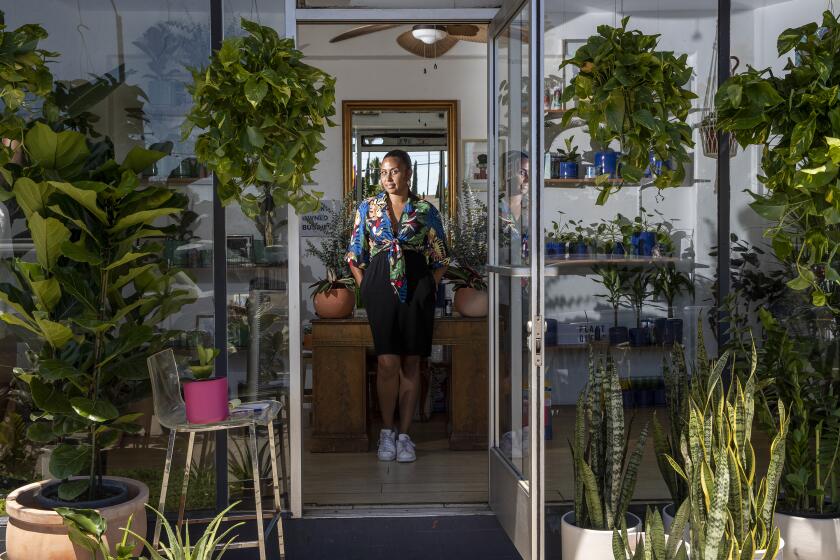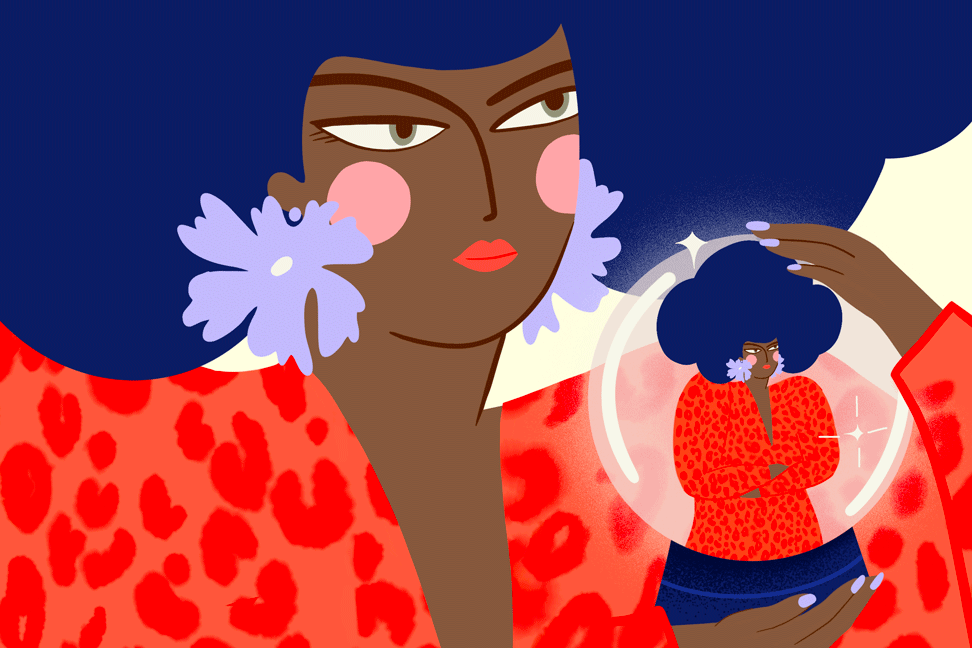Your favorite indie craft market might not survive the pandemic

- Share via
In a typical year, Los Angeles’ parks, public school parking lots and downtown rental spaces come alive with all manner of pop-up markets and craft fairs. These bustling events cater to shoppers in search of unique, handcrafted and small-batch goods.
From seasonal events to weekly affairs, indie makers set up stands filled with one-of-a-kind items. Style-savvy crowds by the thousands snap up statement jewelry, organic skincare products and eco-friendly clothing, while engaging with the artisans who made them. Food trucks often flank the periphery, keeping crowds sated, and DJs set the scene with background beats.
However, 2020 has disrupted much of that. As coronavirus restrictions were put in place, most L.A. retail markets had to pull the plug on their festivities months ago.
“What we do is largely dependent on in-person community events,” said Shawna Dawson Beer, chief executive of Sauce L.A., which produces Artisanal L.A. markets in Santa Monica, downtown L.A. and Pasadena. “We’ve understandably but effectively been mandated out of business.”
Although most of the goodie-packed tents have folded, some event planners have devised workarounds to keep shoppers engaged and small business vendors afloat.
Here are Black-owned restaurants, coffee shops, fitness centers, lifestyle brands and other businesses to support.
Sonja Rasula’s Unique Markets usually sets up shop in L.A. three times a year, drawing upwards of 5,000 shoppers. However, in March, the chief executive was forced to furlough her staff and scrap event plans for the foreseeable future.
Around that time, Rasula’s mother started sending Rasula and her sister regular boxes filled with homemade cookies and other creature comforts to help them weather the pandemic. That gave her the idea to launch Care Package, a quarterly subscription service that introduces customers to items they’d typically find at a Unique event. She plans to personally curate each package and include story cards about the featured small businesses.
“We’re not letting people know what’s in the box ahead of time. But the one thing that will always be included is an artisanal food or beverage item,” Rasula said, honoring her mother.
For Susannah Daly, founder of Renegade Craft, the solution to event cancellations was to go digital. Adopting the mantra “Come together, apart,” Renegade, which reportedly attracts around 20,000 attendees to its biannual Los Angeles State Historic Park events, launched its Virtual Fair series.
“We had the idea to have all of our artists livestreaming at the same time,” Daly said. The experiential online events have offered everything from studio tours to mixology tutorials and tarot card readings, with participating artists buying in on a pay-what-you-can basis.
The team behind the Jackalope Indie Artisan Fair also pivoted to the online realm to maneuver around closures of its Pasadena and Burbank markets. In addition to Instagram Live sessions with some of its usual vendors, cofounder Sara Diederich and her team launched a series of “Makers to Masters” video classes and Local Undercover, an online resource highlighting small businesses across the country.
Diederich estimates Jackalope brings in up to 10,000 attendees engaging with about 200 vendors. By contrast, the Instagram endeavors lure in about 500 viewers.
“Digital life just doesn’t compare to the in-person experience,” she said. “But it’ll have to do for now.”
Following stay-at-home orders, Amorette Brooms pivoted her fashion business to houseplants.
“We considered investing in an online platform for virtual markets,” said Beer, “but it just did not add up for us.” She said her company received neither Paycheck Protection Program loans nor grants, and the small Economic Injury Disaster Loan she did receive was barely enough to cover six weeks of operating expenses. “Despite a lot of talk about supporting small business, little is actually being done in a meaningful way to support small makers and small businesses like ours,” she said.
Still, there are some markets that have opted to continue popping up, live and in person.
As L.A. labels adapt, back-burnered projects and faraway trends come into focus — fast.
On Aug. 2, vintage-shopping mecca Melrose Trading Post resumed its weekly Sunday events with new COVID-compliant rules in place. The market’s typical 3,000-person capacity has now been limited to half that. The Fairfax High School parking lot layout has expanded, with staff members now monitoring the number of patrons in vendor booths and adjusting foot-traffic patterns to allow for social distancing.
“The vendors who were able to return breathed a sigh of relief when we got the green light to open because the COVID unemployment relief benefits expired that week,” said Natalie Jackson, a representative for Greenway Arts Alliance, the nonprofit that produces the long-running market.

She reported that some regular vendors dealt with the Melrose Trading Post’s mid-March closure by selling online via sites such as Etsy, Shopify and Depop. The alliance also posted a vendor directory on its site to keep patrons connected. However, Jackson lamented, “COVID still renders our most vulnerable vendors unable to sell at MTP or any other public events.”
When L.A. clamped down on dine-in seating, Andrew Daneshgar, Grand Central Market’s development manager, took advantage of the suddenly roomier downtown venue by hosting a weekly bazaar. Now, style-hungry patrons can shop for vintage clothing and baubles where, previously, ramen noodles were slurped and bagels were noshed.
“To keep the event safe, we expect our bazaar vendors to maintain the same protocols as the restaurant tenants,” Daneshgar said, citing rules regarding social distancing, mask wearing and hand sanitizer stations.
Meet Christian Guernelli, the Culver City fashion designer, behind an all-digital model squad.
Looking ahead to the holiday season, these market managers display a mixture of optimism and skepticism. Rasula teased to a coming Unique online store featuring wares from small businesses. Diederich is planning a virtual holiday market for Jackalope.
Meanwhile, Daneshgar said the Grand Central Market bazaar is operating on a wait-and-see basis. “COVID has taught us all the hard way that things can change pretty quickly,” he said. “What may have sounded like a good idea today may not be viable tomorrow.”
Beer gave a similarly cautious forecast. “At this point, if I’m being entirely candid,” she said, “I don’t see what we do returning in a meaningful way until sometime in 2021, if not 2022.”
More to Read
Sign up for The Wild
We’ll help you find the best places to hike, bike and run, as well as the perfect silent spots for meditation and yoga.
You may occasionally receive promotional content from the Los Angeles Times.













